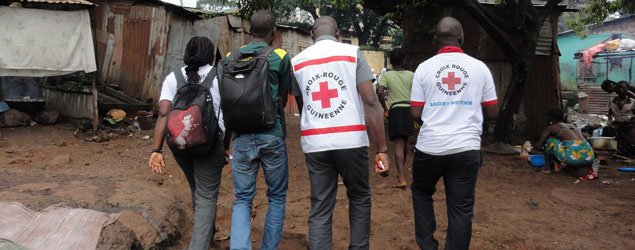
Article
November 14, 2017
Corruption and the Ebola crisis: the unusual courage of the Red Cross

Written by Robert Barrington
The International Federation of Red Cross and Red Crescent Societies (IFRC) recently announced the results of its enquiry into funds lost due to fraud and corruption during the 2014-16 Ebola crisis in West Africa. From a total budget for these activities of $100mil USD, approximately $5mil USD went astray. Transparency International’s Pharmaceuticals and Healthcare Programme assesses the severity.
The Red Cross’ press release about its investigation into the Ebola response expressed ‘outrage’. Its donors will be giving it a hard time. The public will think ‘why donate money when it will just be stolen and not used for the purposes intended?’ And it is true that at times of extreme crisis, every penny that is available for emergency aid should be spent on the emergency response.
In reality, you will always find the criminal and the corrupt who will use any situation to line their own pockets, irrespective of the human cost. The World Bank estimates $7trillion USD is spent annually on healthcare; separate estimates indicate that as much as 6% of this is lost through fraud and corruption, and 10-25% of public procurement funds alone are lost to corruption. The IFRC’s losses may seem large, but they are dwarfed in comparison to the extent of corruption within the health sector globally. And this happens in all countries, from the relative security of the UK’s NHS to emergency situations around the world.
But that does not mean we have to put up with it. Fraud and corruption in the health sector and in emergency response may never be completely eliminated, but they can and should be minimised.
That’s why this report from the Red Cross is so important – a milestone in the aid community’s approach to tackling the corruption that too often hampers and undermines its operations and overall goals. Emergency situations occur often without notice, are highly complex and unpredictable, operate in a vacuum of normal structures and institutions which may themselves have been destroyed, and above all have human lives at stake. The best way to manage this complexity is to be prepared. And the best way to do that is to learn the lessons from last time.
The pattern of fraud and corruption in aid operations has been repeated time and again, from Haiti to Afghanistan. If it is to be minimised, others need to follow the lead of the Red Cross and take a long hard look about how, why and where money went astray. A key first step in any anti-corruption strategy is to admit that there is a problem, and then plan how to minimise it.
Such plans would hard-wire anti-corruption mechanisms into the emergency response. A good example is to integrate it into risks assessments. Before deployment, alongside the other risks that will be assessed like security, there should be a country or location-specific assessment of the corruption risks.
There are things to avoid as well. You don’t want to end up sending an army of accountants in the field, although some donors are themselves so terrified of bad publicity they seem to be pushing for this to happen. Instead, you can make sure you have simple but effective financial controls in place, and train your frontline staff on the importance of doing things in the right way and not cutting corners.
The damage done by corruption is not just the money it takes from the delivery of vital services: it enables criminals to get rich and accumulate power, and when an emergency is over it is the criminals who will be left in charge of the country. It is the poorest who suffer most.
A final word on the Red Cross: well done. That took courage. But it will help to raise awareness among the health and humanitarian communities and make sure that next time, more money goes where it should.
Further Reading:
Hear a report on this on the BBC World Service at 38’50.
Transparency International operates two global programmes addressing the issues covered in this blog:
These programmes are committed to establishing impactful solutions and provide technical assistance to address and mitigate corruption in the health and humanitarian sectors.
Robert Barrington is the Executive Director of Transparency International UK. Robert joined the organisation in 2008 and was appointed as Executive Director in 2013. During his tenure the Pharmaceuticals and Healthcare Programme was developed, launched and is now fully operational.